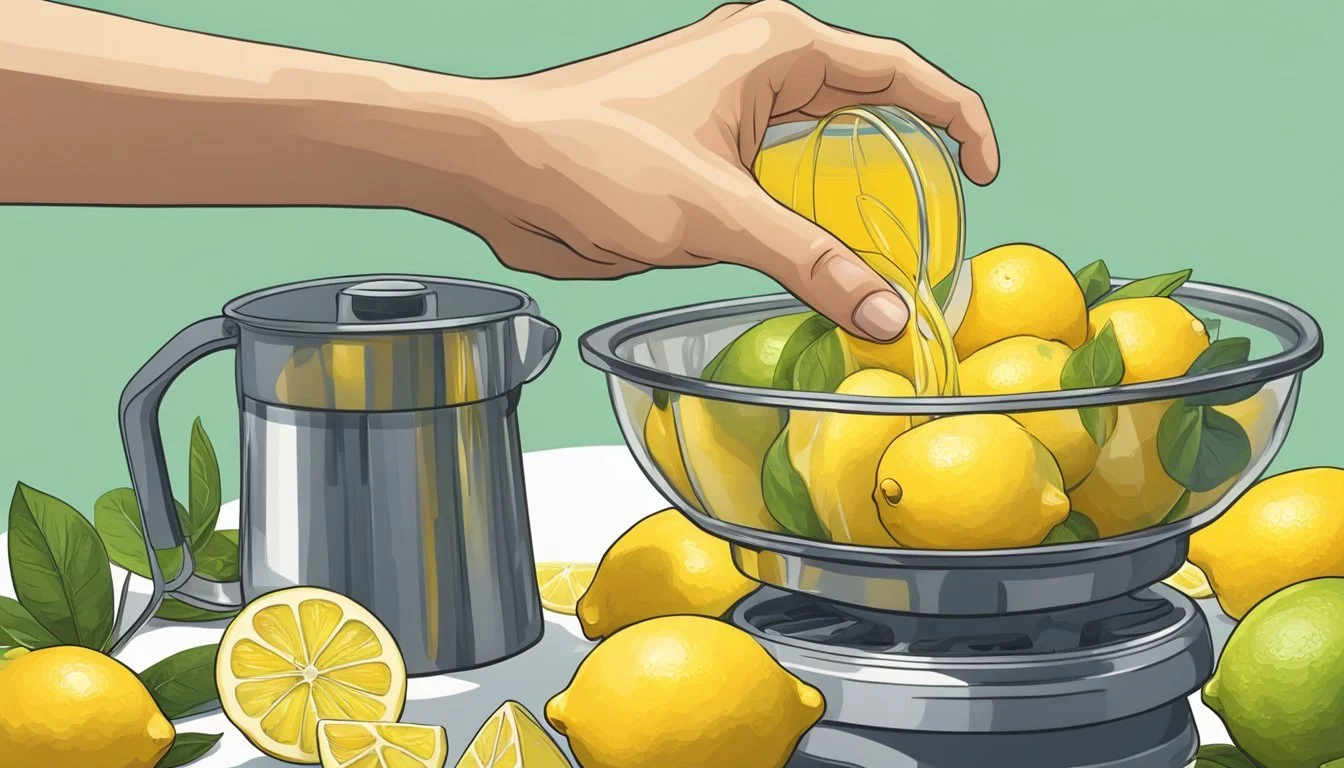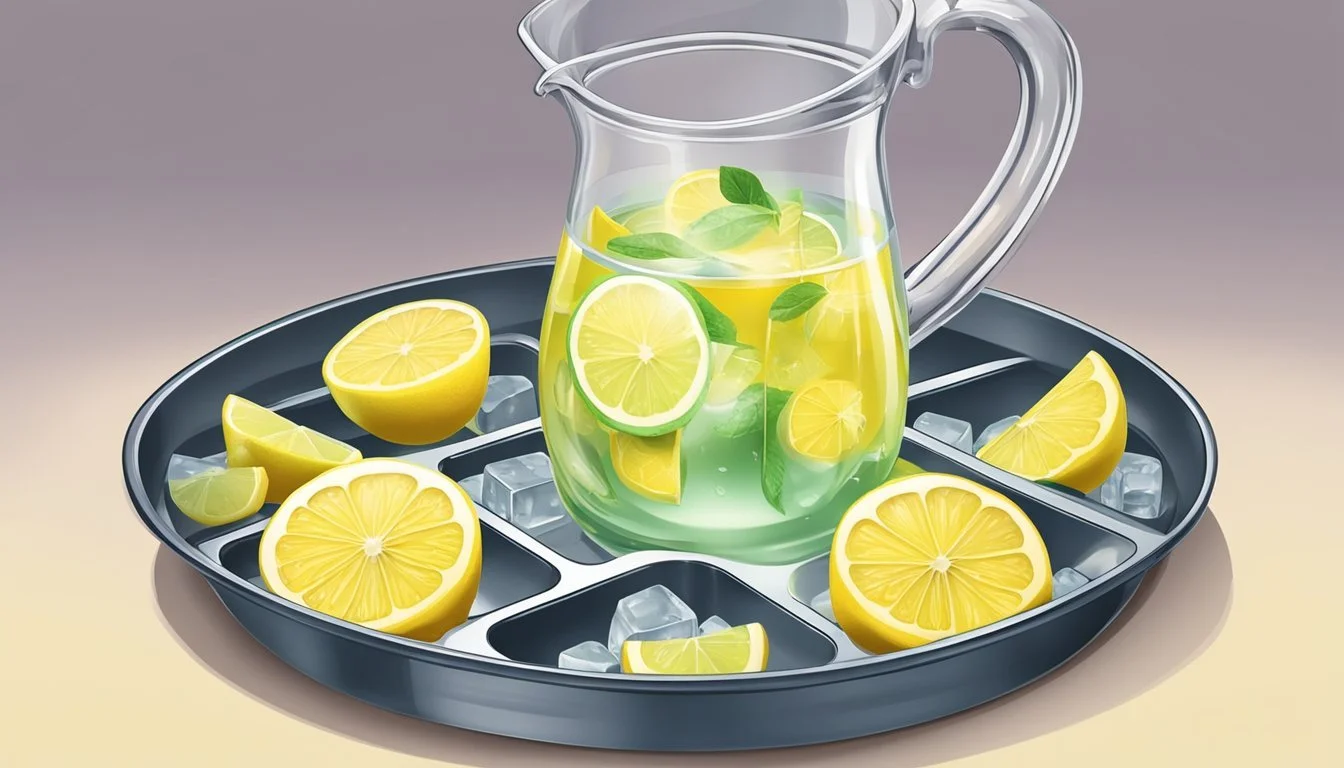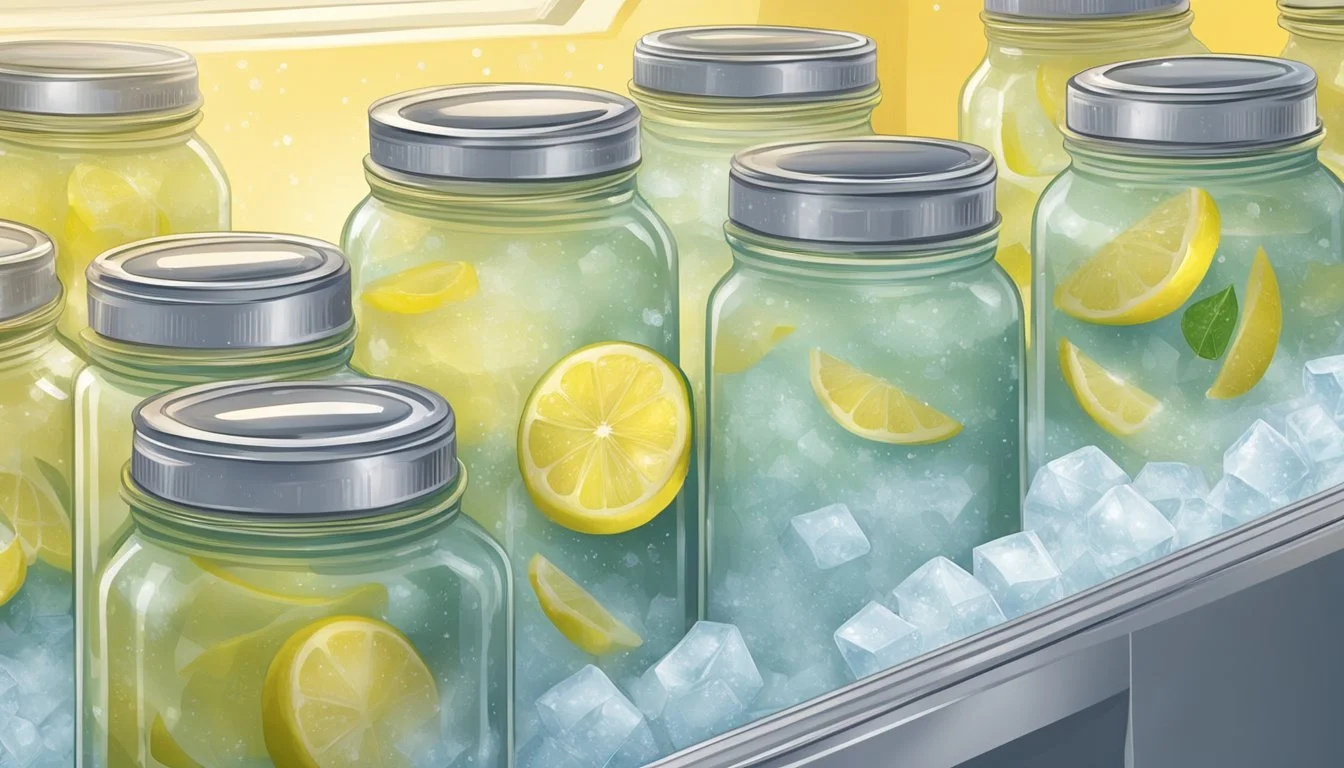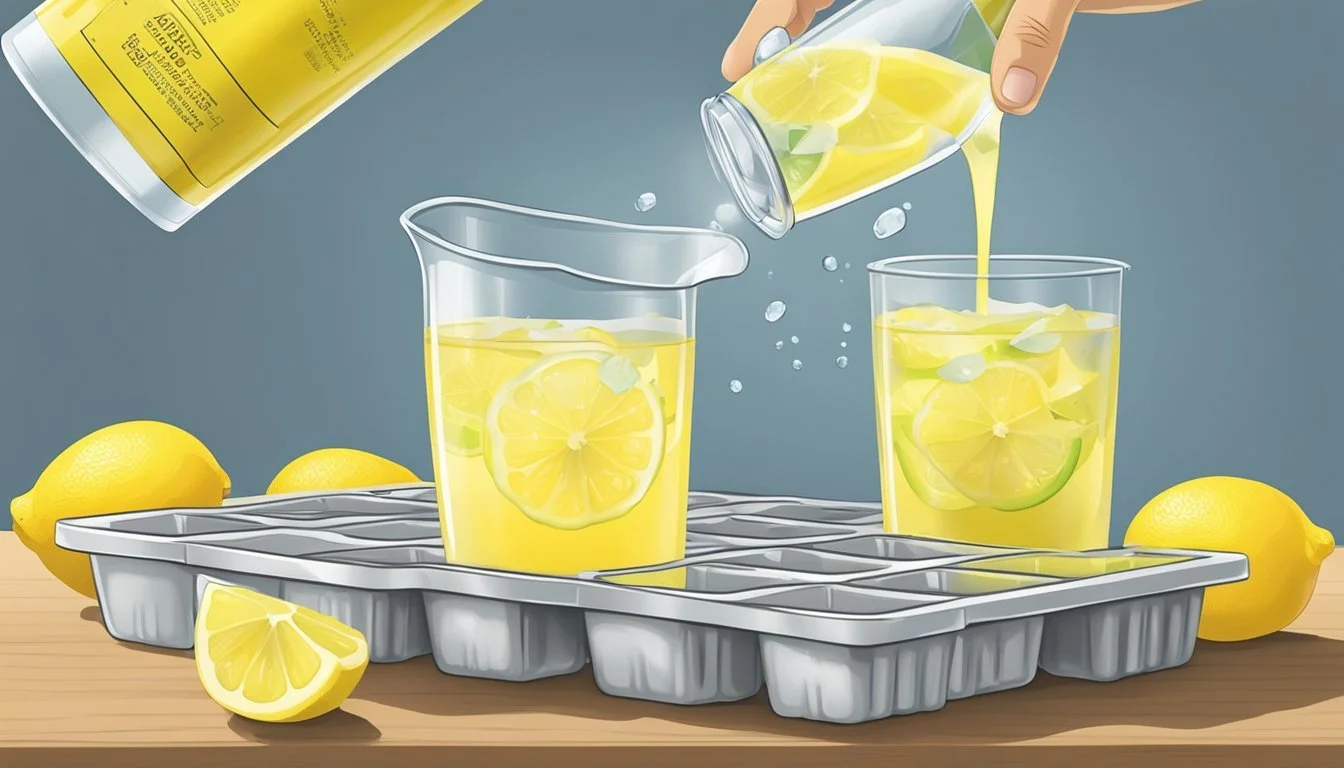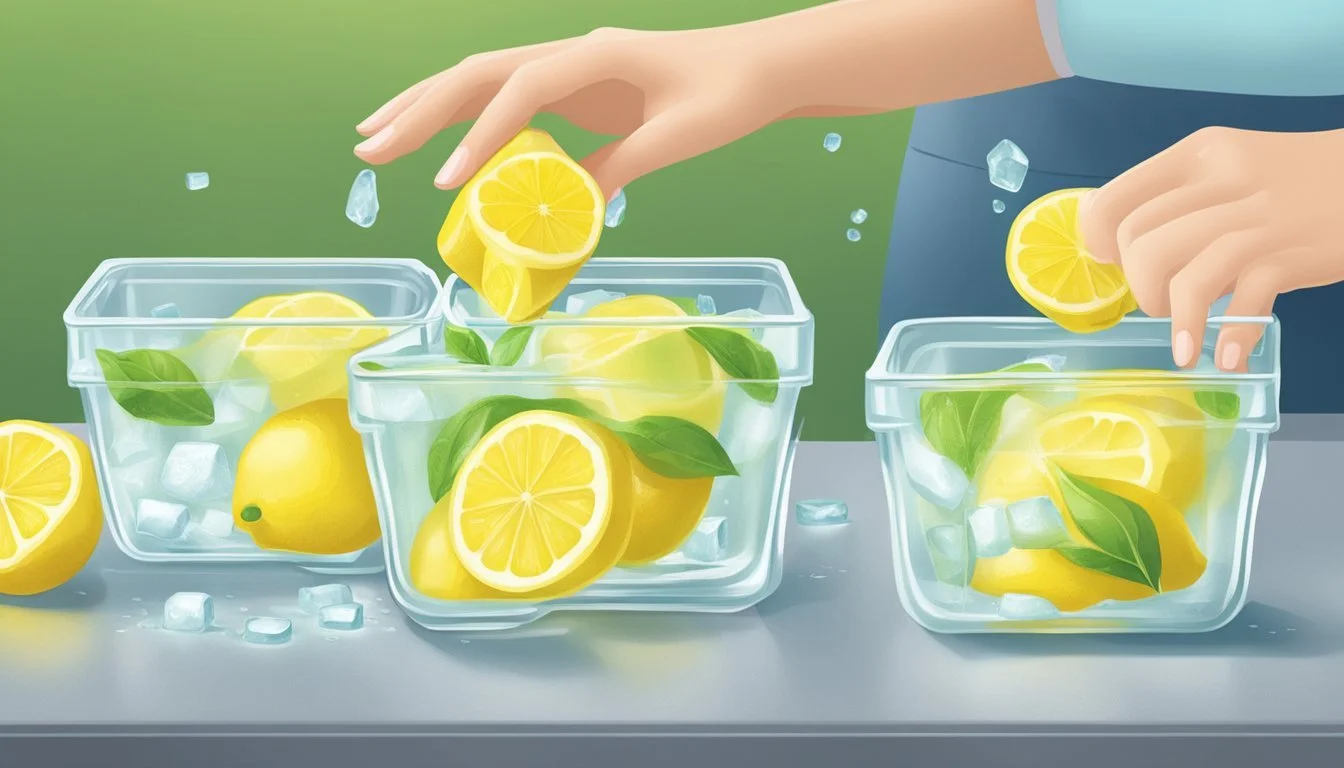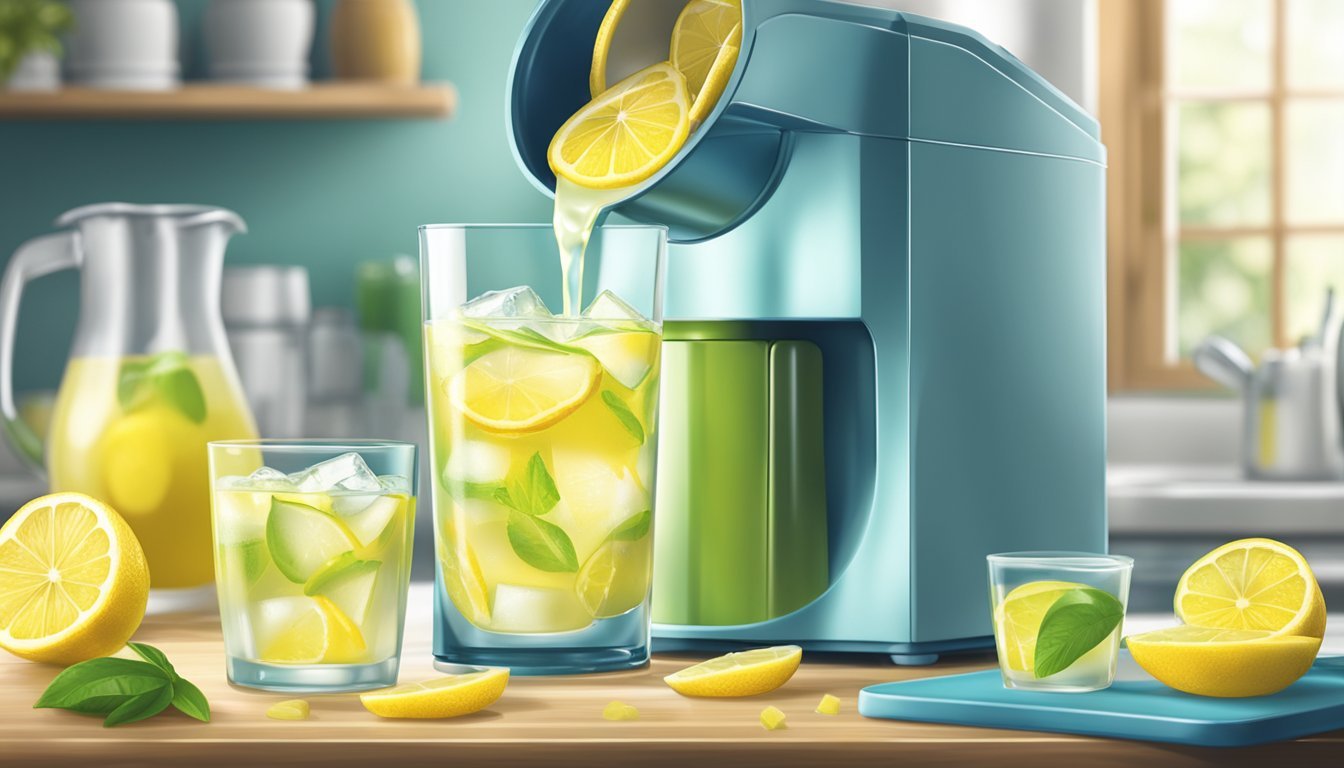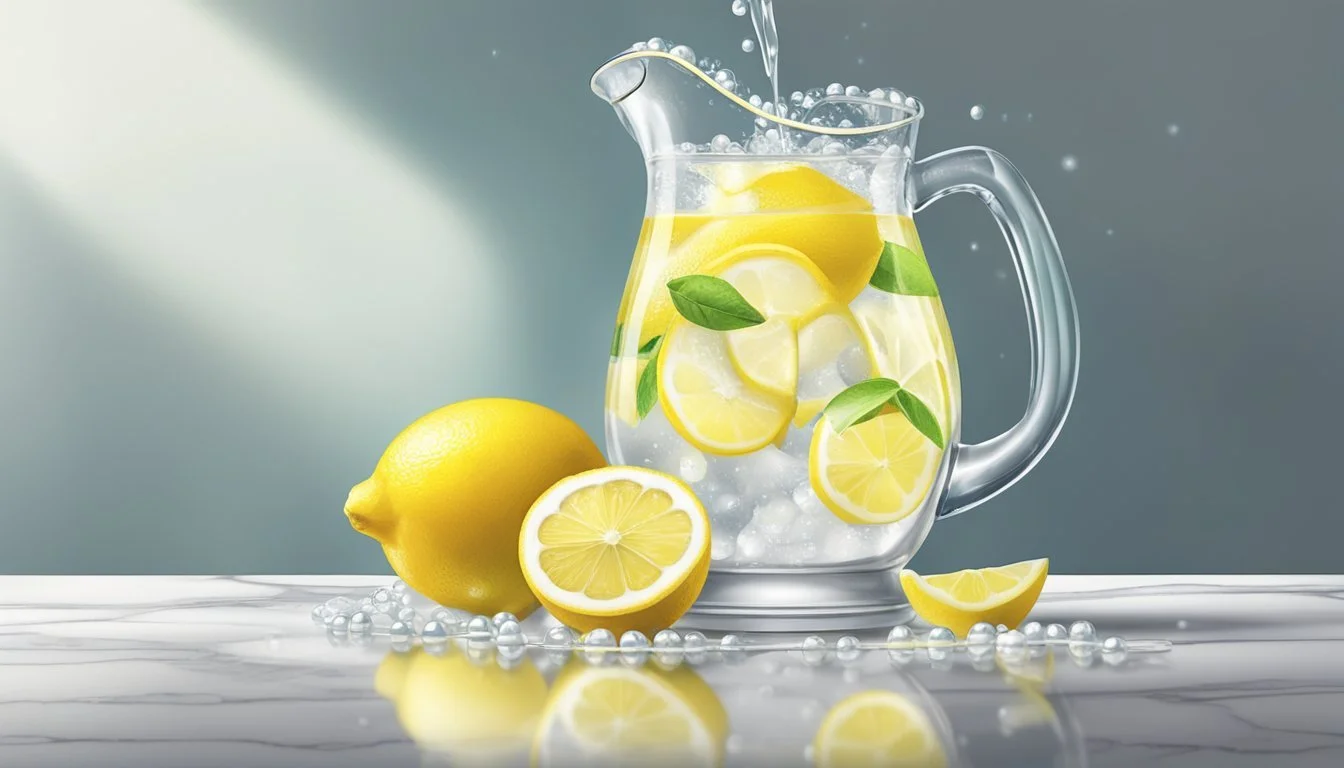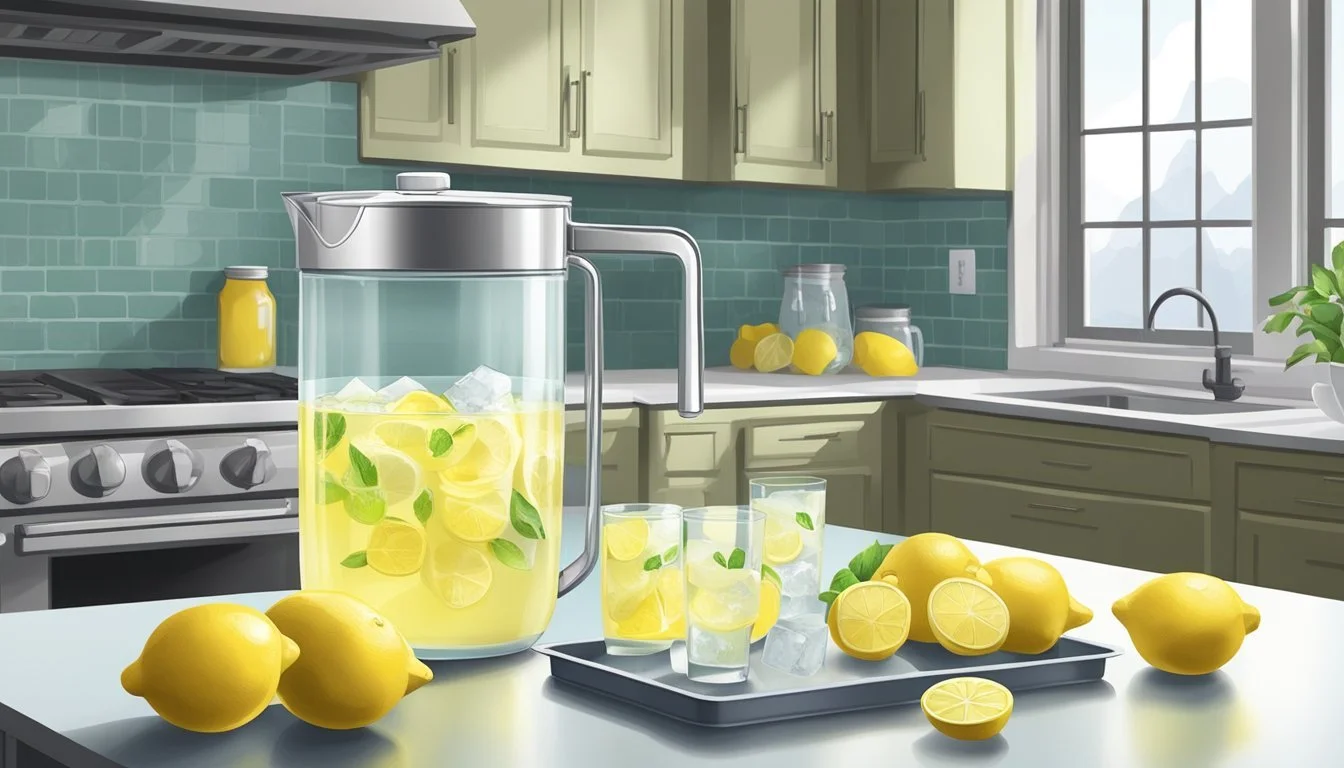How to Freeze Fresh Squeezed Lemonade Concentrate
Preservation Tips and Techniques
Making homemade lemonade concentrate is a convenient way to enjoy a refreshing summer drink any time of the year. Fresh squeezed lemonade epitomizes the taste of summer, combining the tartness of lemons with the sweetness of sugar to create a beverage loved by many. By preparing and freezing lemonade concentrate, individuals have the ability to effortlessly craft delightful lemonade in minutes, providing a quick way to quench thirst or serve a crowd.
Freezing lemonade concentrate involves a simple process of combining fresh lemon juice with sugar to create a syrup that preserves the bright flavors of the fruit. This method ensures that the zest of the lemons is not lost over time. Once frozen, the concentrate can be stored for several months, retaining its quality and making it possible to enjoy homemade lemonade even when lemons are not in season.
To utilize the frozen concentrate, it's as easy as mixing it with a set amount of cold water to reach the preferred balance of sweetness and tartness. The frozen lemonade concentrate not only offers a practical solution for on-demand lemonade but also serves as a versatile base for other lemon-infused beverages and culinary creations. With the right technique, one can always have the essence of summer at hand, ready to be transformed into a chilled glass of lemonade on any given day.
Selecting the Best Lemons
When making fresh squeezed lemonade concentrate, the quality of the lemons is paramount. Only the juiciest and ripest lemons should be used to ensure a rich flavor that withstands the freezing process.
Identifying Ripe Lemons
To identify ripe lemons, one should look for bright yellow skin that is slightly glossy. Ripe lemons will have a bit of give when gently pressed, indicating they are juicy and at peak ripeness. Often, real lemons with thinner skins will yield more juice, which is ideal for concentrate.
Color: Bright yellow
Texture: Slightly glossy, thin-skinned
Firmness: A little give when squeezed
Organic vs Non-Organic
While both organic and non-organic lemons can be used for lemonade concentrate, there are key differences to consider. Organic lemons are grown without synthetic pesticides or fertilizers and often have a more intense flavor. They can be a preferable choice for those wanting to avoid chemical residues.
Organic Lemons: No synthetic chemicals, potentially more intense flavor
Non-Organic Lemons: More readily available, may contain residues but are often less costly
When considering which type of lemon to choose, one's personal health preferences and budget play a significant role. Regardless of the choice, it's essential to thoroughly wash all lemons before use.
Creating the Base
The process of creating a lemonade concentrate base for freezing involves juicing lemons to extract fresh juice, combining sugar and water to make a simple syrup, and then blending these ingredients. Proper proportions and preparation methods will ensure a well-balanced and flavorful concentrate that retains its quality in the freezer.
Juicing the Lemons
Ingredients needed:
Fresh lemons
Method:
Select ripe lemons that are firm and heavy for their size, indicating high juice content.
Roll the lemons on a flat surface to break down the inner segments, making them easier to juice.
Cut the lemons in half and squeeze the juice using a juicer, manual or electric, to extract the maximum amount of liquid.
Ensure the juice is free of seeds and large pulp by straining through a fine mesh sieve if desired.
Making Simple Syrup
Ingredients:
Granulated sugar: Sweetness and consistency
Water: To dissolve the sugar
Method:
Combine equal parts of granulated sugar and water in a medium saucepan. For example, 2 cups sugar to 2 cups water.
Cook over medium heat, stirring frequently, until the sugar has fully dissolved and the mixture is clear but not boiling.
Cool the syrup. It will thicken as it cools, forming the base of the lemon simple syrup.
Blending Ingredients
Combining: Once the lemon juice and simple syrup are prepared, mix them thoroughly in a pitcher or bowl. Here’s a suggested proportion for blending ingredients:
Fresh Lemon Juice Simple Syrup 2 cups 2 cups
Adjusting Flavor: Taste the blend and adjust sweetness or lemon intensity if necessary, considering that dilution will occur later when making lemonade from the concentrate.
Notes: Those preferring natural sweeteners can substitute granulated sugar with an equivalent amount of honey. The sweetener should be fully incorporated into the liquid to ensure a homogenous mixture.
Concentration Process
In the process of making lemonade concentrate, one must carefully balance sweetness, ensure proper cooling before freezing, and use effective freezing techniques to preserve the quality and flavor of the concentrate.
Adjusting Sweetness
To achieve the desired level of sweetness in a lemonade concentrate recipe, one must mix fresh lemon juice with an equal amount of sugar. Typically, this involves combining 2 cups of sugar with 2 cups of cold water to create a simple syrup. Once the sugar is completely dissolved, the mixture is then combined with an equal part of fresh lemon juice, usually 2 cups, to form the base of the lemonade concentrate.
Cooling the Concentrate
Before the lemonade concentrate can be frozen, it is essential that the mixture is cooled to room temperature. Rapid cooling can be facilitated by placing the saucepan in a bath of ice water. This prevents any alteration in flavor that might occur if the concentrate is left to cool too slowly or is placed in the freezer while still warm.
Freezing Techniques
For freeze lemonade, there are two preferred methods:
Ice Cube Trays: Pour the cooled concentrate into ice cube trays. Once frozen, these cubes can be transferred to an airtight container or freezer bags for long-term storage.
Airtight Containers: Alternatively, the concentrate can be directly frozen in airtight containers. This method is suitable for larger quantities. It is important to leave some room at the top of each container as the concentrate will expand when frozen.
Using these techniques, the frozen lemonade concentrate can be stored in the freezer for several months, ready to be mixed with water and served over ice for a refreshing drink.
Proper Storage
A critical aspect of preserving the quality of fresh squeezed lemonade concentrate is how it's stored. Utilizing proper techniques ensures that its flavor and freshness remain intact until usage.
Using Airtight Containers
One should use airtight containers when storing lemonade concentrate to minimize exposure to air and prevent freezer burn. Mason jars are a popular choice for their sealable lids, making them excellent for both freezing and refrigeration. When filling these containers, it is advisable to leave about 1/4 inch headspace at the top to allow for the liquid's expansion when frozen.
Maximizing Shelf Life
To maximize the shelf life of the lemonade concentrate, one should store the sealed containers in the back of the freezer, where the temperature is most constant. The concentrate can be kept frozen for up to 6-12 months. Labeling the containers with the date of freezing helps in keeping track of how long they've been stored. When ready to use, transferring the concentrate to the refrigerator to thaw overnight is recommended.
Thawing and Serving
Thorough thawing and precise mixing are essential for enjoying a refreshing glass of homemade lemonade from concentrate. Here's how one can expertly handle these steps to ensure the perfect balance and flavor of the lemonade.
Thawing Concentrate
To thaw the lemonade concentrate, it is recommended to transfer it from the freezer to the refrigerator several hours before serving or to leave it at room temperature for a quicker process. It's important to plan ahead; the concentrate should be completely thawed to mix evenly when making a pitcher of lemonade. Avoid using a microwave to hasten thawing, as it may unevenly heat the liquid and affect the quality.
Mixing Concentrate with Water
Once the concentrate is fully thawed, it should be diluted with water to make lemonade. The ratio of concentrate to water will determine the flavor strength, but a general guideline for the best lemonade recipe is to mix equal parts of water and concentrate. For instance:
Pitcher of Lemonade: Combine 4 cups of thawed concentrate with 4 cups of cold water.
Individual Servings: Mix 1 part concentrate to 1 part water, adjusting to taste.
Stir the mixture well to ensure the concentrate is fully incorporated. Serve over ice for an exceptionally refreshing beverage and garnish with a slice of lemon for an added touch of elegance.
Variations and Add-ons
When freezing fresh squeezed lemonade concentrate, one has countless opportunities to infuse the beverage with unique tastes and aromatic herbs. These customizations can transform the classic lemonade into a gourmet refreshment suitable for various occasions and preferences.
Incorporating Different Flavors
One can easily enhance the basic lemonade concentrate with an array of flavors. Berry lemonade is a popular choice. To make strawberry lemonade, one can puree fresh strawberries and strain them to remove seeds before mixing with the lemonade concentrate. This can be done before freezing for a ready-to-use flavored concentrate. Additionally, a variety of berries such as raspberries, blackberries, or blueberries can be used in a similar fashion to add a distinct and appealing twist.
Strawberry Lemonade: Puree then strain.
Raspberry Lemonade: Mash and sieve.
Blueberry Lemonade: Cook with sugar, strain, then blend.
Making Herbal Lemonades
Herbs like fresh mint can introduce a refreshing edge to lemonade. For a mint lemonade, one simply adds mint leaves to the concentrate mixture while heating it. The heat extracts the essential oils from the mint leaves, infusing the syrup with flavor. Once the mixture is cool, remove the mint leaves, and then pour the concentrate into an airtight container before freezing.
Mint Lemonade Concentrate: Add fresh mint leaves during simmer.
Note: Always ensure to strain any added purees or herbs for a smooth concentrate.
Health and Nutritional Information
Freezing fresh squeezed lemonade concentrate offers a convenient way to enjoy this delicious and refreshing beverage while retaining its nutritional value. Here is what one needs to know about the health and nutritional aspects of lemonade concentrate.
Caloric Content
The caloric content of frozen lemonade concentrate largely depends on the amount of sugar added during preparation. Typically, a homemade lemonade concentrate might contain the following per serving:
Calories: Approximately 100 calories
Carbohydrates: Mainly from sugars, around 25 grams
Vitamins and Minerals
Lemonade primarily provides vitamin C and some minerals, which are preserved even when the juice is frozen. For example:
Vitamin C: Crucial for immune function and skin health, with one lemon providing about 18.6 milligrams.
Potassium: Essential for heart and muscle function, with one lemon offering about 49 milligrams.
Other nutrients in smaller amounts include:
Nutrient Amount Calcium ~6 mg Iron ~0.1 mg Fiber ~0.3 g Protein ~0.2 g Fat ~0.1 g
Squeezed lemonade concentrate with no added sugar can be a low-calorie option high in vitamin C. However, when sugar is added for sweetness, it increases the caloric content without contributing additional nutritional value.
Serving Suggestions and Pairings
When using frozen lemonade concentrate, the possibility for refreshing beverages and pairings with snacks or dishes is vast. The right combination can enhance any meal or social gathering.
Accompanying Snacks and Dishes
Frozen lemonade concentrate lends itself well to a variety of snacks and dishes. A pitcher of homemade lemonade is the perfect companion for:
Grilled seafood, providing a zesty counterbalance to the smokiness of the grill
Light salads with vinaigrette dressings, complementing the acidic profile
Fruit platters, especially with melon or berries
One can garnish their lemonade with lemon slices to add visual appeal and a hint of fresh lemon zest.
Non-Alcoholic and Alcoholic Mixes
The versatility of frozen lemonade concentrate allows for both non-alcoholic and alcoholic mixes:
Iced Tea: Combine equal parts of lemonade and iced tea for a classic Arnold Palmer.
Club Soda: Mix with club soda to create a fizzy lemonade spritzer, ideal for those seeking a non-alcoholic option with a twist.
For those who prefer an alcoholic option:
Cranberry Juice: Mix with cranberry juice and vodka for a vibrant and tart cocktail.
Craft Cocktails: Use as a base in various craft cocktails to add a lemony sharpness that balances the spirits.
Preparation Tips
When making lemonade concentrate to freeze, efficiency and technique are paramount. One must properly extract lemon juice and cook the sugar syrup to ensure peak flavor and preservation.
Squeezing Lemons Efficiently
The first step in preparing lemonade concentrate is obtaining the juice from juicy lemons. Expert tips suggest that room temperature lemons yield more juice—rolling them on the counter beforehand can help. A handheld juicer is highly effective for this task, as it makes the process quicker and extracts more juice than squeezing lemons by hand. Ensure all seeds and excess pulp are removed to get a smooth concentrate.
Sugar Syrup Technique
Creating a perfect sugar syrup is critical for a sweet, well-preserved concentrate. The syrup is made by dissolving sugar in water over medium heat. Stir the mixture until it is clear—this indicates that the sugar is fully dissolved. It's important not to let the syrup boil, as this can change the concentration of the sugar solution and affect the final taste and freezing properties of the lemonade concentrate.
Recipe Details
Making a homemade lemonade concentrate with just a few simple ingredients not only allows for easy preparation, but also offers a delicious base for a refreshing drink that can be enjoyed all year round. This method is a straightforward, three-ingredient recipe designed for home freezing.
Ingredients List
Lemon Juice: 2 cups fresh squeezed
Water: 2 cups
Sugar: 2 cups
Step-by-Step Instructions
Prep Time: Begin by allocating approximately 10 minutes for preparation.
Cook Time: The mixture will need an additional 5 minutes to cook.
Total Time: From start to finish, one should anticipate a total time of about 15 minutes.
In a medium saucepan, combine the water and sugar over medium heat. Stir the mixture often to help the sugar dissolve without letting it boil. This should take around 5 minutes. The aim is to create a simple syrup.
Once the sugar has completely dissolved and the mixture is clear, remove the pan from the heat.
Add the freshly squeezed lemon juice to the simple syrup, stirring it thoroughly to combine.
Allow the mixture to cool to room temperature. Then, pour the lemonade concentrate into a freezer-safe container or bag.
Label the container with the date of preparation for future reference.
Freeze the concentrate, which can last effectively for up to 5 months.
When one is ready to enjoy the lemonade, simply thaw the concentrate and dilute with water to taste. One batch typically serves around 6-8 glasses, making it a perfect recipe for gatherings or for those seeking a convenient homemade lemonade option throughout the seasons.
Event Planning
When organizing an event like a BBQ or potluck, ensuring that there is an adequate supply of beverages is crucial. Freezing fresh squeezed lemonade concentrate is an effective method to plan for large groups and outdoor events, providing a refreshing drink option that can be easily prepared in advance.
Pitcher Quantities for Groups
It is important for hosts to anticipate the amount of lemonade needed for their guests. For a whole family gathering or sizable event, a good rule of thumb is to prepare at least one gallon of lemonade per every ten guests. This equates to roughly four pitchers. Consider that on hot days, individuals will likely consume more, so hosts may need to increase quantities accordingly.
Guests Pitchers of Lemonade (Approx.) 10 1 gallon (4 pitchers) 20 2 gallons (8 pitchers) 50 5 gallons (20 pitchers) 100 10 gallons (40 pitchers)
Outdoor Event Considerations
Outdoor events such as BBQs require special attention to how beverages are stored and served. To save time and avoid the dilution of flavor, hosts should freeze lemonade concentrate in advance and thaw it on the day of the event. They should use insulated dispensers to keep the lemonade cold without needing excessive amounts of ice. For large gatherings, beverage recipes such as fresh squeezed lemonade can be prepped in bulk, ensuring that no guest is left without a drink. Hosts should also provide a dedicated shaded area for beverage dispensers to maintain optimal temperature and freshness.
Purchasing Recommendations
When making and freezing homemade lemonade concentrate, having the right tools and containers can make the process more efficient. Selecting a quality juicer will ensure maximum juice extraction, while the appropriate containers are crucial for safe freezing and thawing.
Recommended Juicers for Home Use
For those who prefer to squeeze lemons manually, a handheld juicer is a practical and affordable option. The Chef'n FreshForce Citrus Juicer is highly rated for its leverage and ease of use. It’s available on platforms like Amazon, where one can also benefit from user reviews. On the electric front, the Breville 800CPXL Citrus Press is a durable and powerful choice, ensuring quick and thorough juicing.
For those participating in the Amazon Associate program, promoting these juicers may earn them a small commission. However, the primary goal remains to offer readers reliable recommendations that serve their needs best.
Best Containers for Freezing
Mason jars are an excellent choice for freezing lemonade concentrate. They are durable, seal well, and are designed to withstand temperature changes. It is recommended to opt for wide-mouth mason jars which facilitate easy pouring and cleaning. To ensure safety and prevent cracking, one should leave about an inch of headspace to allow for expansion when the liquid freezes.
Quart-sized mason jars are ideal for large batches, while
Pint-sized mason jars work well for smaller servings.
One can find these jars in bulk at local home goods stores or online retailers. Again, participation in the Amazon Associate program can provide an avenue to suggest these products, possibly earning a commission while assisting readers in making informed decisions.
Alternative Sweetener Options
When making lemonade concentrate, one traditionally uses sugar to sweeten the mixture. However, individuals seeking alternatives to refined sugar can consider several other sweeteners that offer varied flavor profiles and benefits.
Honey is a natural sweetener with antibacterial properties and a complex taste. Its liquid form makes it easy to blend with lemon juice, although it is sweeter than sugar, so one should adjust the quantity accordingly. Typically, less honey is needed to achieve the desired sweetness.
Organic Sugar is less processed than refined sugar, retaining more of the natural molasses of the sugar cane. It offers a slight caramel-like flavor and can be used as a one-to-one substitute for refined sugar.
For those avoiding sucrose entirely, here are some additional options:
Maple Syrup: A plant-based syrup with a unique flavor, which can complement the tartness of the lemons.
Coconut Sugar: While not as sweet as conventional sugar, this option adds a brown sugar-like taste and may require more to reach desired sweetness.
Here is a brief guide to substituting sugar with alternative sweeteners in a standard lemonade concentrate recipe:
Sweetener Quantity to Substitute for 1 Cup of Sugar Honey 3/4 cup Maple Syrup 3/4 cup Coconut Sugar 1 cup plus 1-2 tablespoons Organic Sugar 1 cup (equal substitution)
It's important to taste and adjust the sweetness level of the lemonade concentrate when using these substitutes, as the sweetening power varies. Remember that modifications may also slightly alter the flavor of the final product.
Refreshing Variants to Explore
When preparing homemade lemonade concentrate for freezing, one can experiment with various adjuncts to create invigorating variations.
Sparkling Lemonade: Thaw the concentrate and blend with sparkling water for a fizzy twist. The carbonation adds a refreshing effervescence that elevates the lemonade to a fancier drink.
Cranberry Lemonade: Enhance the tartness and color by mixing cranberry juice into the lemonade concentrate. It not only offers a sharp, distinct flavor but also introduces an enticingly vibrant hue.
Minute Maid Mix: Incorporate a splash of Minute Maid lemon juice, if available, to augment the homemade lemonade concentrate with a familiar and consistent lemon flavor.
Here's a simple table to guide experimentation with these variants:
Variant Ingredient to Mix with Lemonade Concentrate Suggested Ratio Sparkling Lemonade Sparkling Water 1:3 Cranberry Lemonade Cranberry Juice 1:4 Minute Maid Mix Minute Maid Lemon Juice 1:4
One can adjust the ratios according to taste preferences. Each variant should be thoroughly mixed with the concentrate before serving to ensure consistency in flavor. Freezing the variants should be approached with the same considerations as the original concentrate—ensuring the mixture is cool and placing it into suitable freezer-safe containers or bags.
Economic Benefits of Homemade Concentrate
Making lemonade concentrate at home has several economic benefits over purchasing store-bought lemonade. Homemade lemonade concentrate not only allows for cost savings but also ensures that consumers are in control of the ingredients and the quantities, tailoring the concentrate to their specific taste preferences and health considerations.
Cost Comparison:
Store-Bought Lemonade: On average, a branded lemonade concentrate can cost several dollars per unit. In addition, there may be inclined fees such as a small commission for online purchases or delivery charges.
Homemade Concentrate: The price of making lemonade concentrate at home is significantly lower as it primarily entails the cost of lemons and sugar, which can be bought in bulk to further reduce expenses.
Long-term Savings:
Bulk Purchases: By buying lemons and sugar in bulk, individuals can capitalize on bulk pricing, reducing the per unit cost of the concentrate.
Reduced Waste: Homemade concentrate allows for better portion control, which means less waste compared to pre-packaged options which may go unused and spoil.
Versatility and Efficiency: Homemade lemonade concentrate can be prepared in large quantities and frozen for future use, translating to savings in both time and money. Having concentrate on hand means there is no need for frequent store visits, which saves on fuel and the associated costs of transportation.
In summary, the financial advantages of creating lemonade concentrate at home are palpable. Individuals gain more savings, control, and flexibility, without compromising on taste or quality.
Environmental Impact and Sustainability
When freezing fresh squeezed lemonade concentrate, consumers can influence both the environmental impact and sustainability in several ways. Fresh lemons, when sourced locally, reduce transportation emissions. Buying organic lemons further enhances sustainability by supporting farming practices that limit synthetic pesticides and fertilizers, thereby reducing soil and water contamination.
Sustainability encompasses more than just the lemons themselves; it includes the consideration of packaging and energy use. Freezing lemonade concentrate requires energy, and consumers should be mindful of the source of their home's electricity—renewable energy sources contribute to a smaller carbon footprint.
Here's a quick guide to sustainable choices when freezing lemonade concentrate:
Lemons:
Choose organic lemons to avoid harmful agricultural chemicals.
Opt for local farm produce to minimize transportation carbon emissions.
Energy:
Utilize energy-efficient freezers.
Consider the time of day—freezing during off-peak hours may reduce energy strain on the grid.
Packaging:
Package the concentrate in reusable containers to lower waste production.
Avoid single-use plastics, opting for glass or BPA-free options.
By making these considerate choices, individuals contribute to a healthier planet. It behooves consumers to remain informed on sustainable practices and strive to support eco-friendly products and methods.
History and Origin of Lemonade
Lemonade's origin is often traced back to ancient Egypt, where a lemon-based drink called qatarmizat was made and consumed. The earliest written evidence of lemonade dates to the 12th century, credited to Persian poet and physician Ibn Jumay. During the medieval period, trade routes brought lemons to the European continent, where the beverage gained popularity.
By the 17th century, lemonade became a commercial drink in Paris, first recorded on August 20, 1630. Initially, it was made from sparkling water, lemon juice, and honey. The drink's refreshing quality and popularity led to the creation of a lemonade vendors' union in 1676, the Compagnie de Limonadiers. Lemonade's appeal spanned across Europe, with variations emerging in different cultures.
Component Description Base Lemon juice, a staple for its tangy flavor Sweetener Initially honey, later replaced by sugar Diluent Sparkling or still water to dilute acidity
The tradition of lemonade has continued to evolve, with recipes adapting over time to include more accessible sweeteners like sugar, creating the classic sweet-tart balance. The drink often serves as a symbol of refreshment, especially during warm weather, owing to its cooling properties. Lemonade stands run by children have become a cultural icon in America, representing entrepreneurship and the homemade essence of this beloved drink.
Lemonade in Popular Culture
Lemonade, commonly celebrated for its refreshing qualities, has taken a distinctive spot in popular culture. The beverage, often associated with summer and relaxation, features in various forms of media and branding, symbolizing simplicity and sweetness.
In the music industry, lemonade has been the centerpiece of songs and albums. For example, Beyoncé's critically-acclaimed album titled "Lemonade" used the beverage as a metaphor for life's bitter and sweet moments.
Minute Maid, a leading brand in the lemonade market, has become almost synonymous with the drink. Their marketing efforts have placed lemonade at the center of family-friendly refreshment across multiple generations. The brand's presence in movies, television ads, and sponsorships further reinforces its cultural significance.
Television and film have also portrayed lemonade as a staple of homegrown enterprise, with the clichéd 'lemonade stand' serving as a first business for many young characters. This trope represents the American entrepreneurial spirit and is a nod to the beverage's widespread popularity.
In literature, lemonade often appears in scenes depicting lazy summer days, community gatherings, or as a comforting offering in times of need. It's referenced as the go-to drink for both solace and joy, attesting to its embedded status in societal norms.
Medium Representation Music Used as a metaphor and album title Branding Synonymous with family refreshment Film & TV Symbol of youth entrepreneurship Literature Depicts comfort, joy, and community ties
By intertwining with these elements of popular culture, lemonade has become more than a drink; it's a symbol of life's dualities and a cherished cultural icon.


